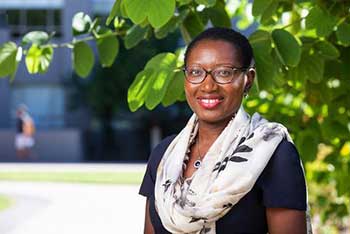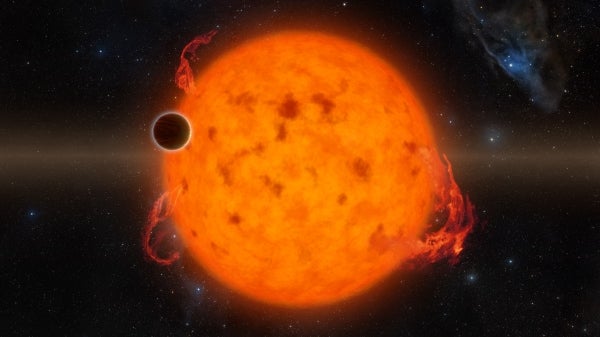Is space the final frontier for the benefit of all mankind — or possibly the world’s new battleground?
An Arizona State University professor will attempt to answer that question in a conference next week.
ASU Gammage will be the host site for TEDxASU 2019 "NextGen," which takes place March 25 and will focus on life in the 22nd century. Nine speakers — including five ASU faculty members — will explore how we can take part in building that future together.
Timiebi Aganaba-Jeanty, an assistant professor in the School for the Future of Innovation in Society with a courtesy appointment in the Sandra Day O’Connor College of Law, spent a majority of her career in the space industry before coming to ASU. She believes the days of space as a sanctuary are long over, as evidenced by the more than 65 countries pouring billions of dollars into space research and development programs.
That certainly increases the risk of potential conflict one day, said Aganaba-Jeanty.
ASU Now caught up with Aganaba-Jeanty as she prepared for her March 25 presentation.

Timiebi Aganaba-Jeanty
Question: What ground will your presentation cover?
Answer: My presentation is titled “Is a Space Future Without Conflict Possible?” I really have a unique perspective on space, having lived and worked on space research in four different countries, including starting my career as a legal officer at the Nigerian Space Agency. My presentation thus takes the audience on an international journey with regards to the way space is viewed from different lenses. It also covers the age-old dilemma of answering the question “Is space worth the investment?” and “Who benefits from exploration?” As more players engage in space exploration, is there an increased risk of conflict and if so, what can be done about that?
Q: Could space become a war zone in the next 50 years?
A: It seems likely that the days of thinking about space as a sanctuary are long over. The space domain is now viewed as a strategic territory much like Antarctica and other areas of the global commons that hold immense potential, even if we have not quite figured out what that potential is yet. As such, it is likely that space will increasingly be seen as a domain in which assets need to be safeguarded and protected. That does not mean it will become a war zone, and we are working toward developing rules of the road and confidence-building and transparency measures to minimize the risk of that happening.
Q: In the beginning, space had two dominant actors. Now, there are many countries and private companies wanting in on the action. How does that impact what the current U.S. administration will do?
A: According to Euroconsult, just on the government side alone, there are over 65 countries investing $10 million or more on space per year. And if we look at the world of startup investments in the space domain, startup space ventures have attracted over $18.4 billion of investment since 2000 according to Bryce. All that is to say, space is really seeing a boom right now. Companies like Elon Musk’s SpaceX, Jeff Bezos’ Blue Origin and Richard Branson’s Virgin Galactic have really inspired the population about the potential of increased private and commercial engagement in space. This means that the current administration has to think long term about how that relationship will work with space becoming a multistakeholder environment. How do we spur innovation while ensuring adequate regulatory regimes to provide oversight and supervision of these increasing actors? How do we ensure that we don’t create more and more space junk as more actors use the space domain?
Q: What, in your opinion, would increase the potential for conflict?
A: Lack of transparency and Earth geopolitics extending to space, generally. The issue we have in space is that it is often difficult to determine intent till you actually see the end result. States also find it difficult to share some of the enabling technologies because of its sensitive nature, but if we don’t ensure that space is open for all and that people are actually facilitated to cooperate and find opportunities to practice and build in trust, it will not get any easier to determine intent, which will lead to misunderstandings.
Q: How much of it is politics and how much of it is science?
A: Space is very political. For many scientists and enthusiasts, it looks like it’s all about science and technology. I may be biased as a policy analyst, but it seems that there could be a great many easier domains to focus on if it was all about science! The fact is that space captures the human imagination for whatever reason. It drums up some terror about the unknown, while stimulating the imagination about the possibilities it holds. This can certainly be used for political gains.
Top photo courtesy Pixabay
More Science and technology

Real AI solutions helping people now
AI may be everywhere, but its impacts on day-to-day life are more surprising — and beneficial — than you might realize. From scanning thousands of images to prevent crop shortages to creating …

ASU forges strategic partnership to solve the mystery of planet formation
Astronomers have long grappled with the question, “How do planets form?” A new collaboration among Arizona State University, Michigan State University and Lawrence Livermore National Laboratory will…

AI for AZ: ABOR funds new tools for state emergency response
A huge wildfire rages in the wilderness of Arizona’s White Mountains. The blaze scorches asphalt and damages area bridges, causing traffic accidents when residents attempt to evacuate. As hospitals…
